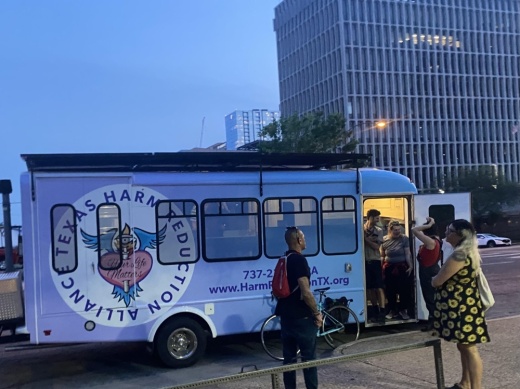Activists, people with a history of substance abuse and emergency medics spoke during the town hall, urging elected leaders to do more to address overdoses and focus on community work—rather than policing—around both drug use and homelessness.
Among the leaders in the crowd were Travis County Judge Andy Brown; commissioners Ann Howard and Margaret Gómez; Pilar Sanchez, county executive for health and human services; attorney Delia Garza; District Attorney Jose Garza; Austin council members Vanessa Fuentes and Ann Kitchen; Austin Public Health Authority Desmar Walkes; APH Director Adrienne Sturrup; APH Chief Epidemiologist Janet Pichette; and others.
Drug-related deaths increased in Travis County by 28% between 2019 and 2021.
The THRA and other speakers focused on the need for harm reduction.
Through their harm reduction work, the THRA and other nonprofits are providing drug users with supplies, such as fentanyl test strips, naloxone—a drug, often called by the brand name Narcan, that can be used to save a person's life during an overdose—and syringes. They also provide medical care and connections to community resources as well as advocate for the needs of people using illicit drugs and people who are experiencing homelessness.
THRA representatives and other advocates called on city and county officials to work toward declaring drug-related deaths a public health emergency.
Several leaders in the crowd, including Brown, Howard, Fuentes and Kitchen, raised their hands in support of the initiative.
In March, Travis County commissioners asked Walkes about the possibility of declaring the increase in drug-related deaths a crisis, but at the time Walkes said it would not be a viable option to find more money.
Speaking with Community Impact Newspaper after the event, Walkes said she supported working toward declaring drug-related deaths a public health emergency, but cautioned that leaders would need more data before going to the federal government with the request.
The advocates also asked for increased availability of Narcan and methadone—a medicine used to treat drug addiction—and increased pushback against state laws, which they said make it hard for many individuals to access those medicines and make it illegal to distribute items, such as fentanyl test strips.
Increasing overdoses
Matt Hunt, a street outreach coordinator with Community Care, said he has seen an increasing number of individuals overdosing and dying during his work providing health care to individuals who shelter in the woods or under bridges.
“When I started, what I saw was people who had cancer; ... they survive rape and assault. But the fentanyl is killing them,” Hunt said.
According to Austin Public Health data, the biggest increase in drug-related deaths were from fentanyl.
At a recent Travis County Commissioners Court meeting, Walkes said the increase in deaths is attributed to pills that are laced with substances unknown to the user, often fentanyl.
Austin EMS Association Representative Mike Sassar said he is seeing an increase in pill usage, especially in juveniles.
Sassar, who attended school in Austin, said when he was growing up students would pass around pills, such as Xanax or Vicodin. Now, he said students may be unknowingly spreading fentanyl.
“No kid, no parent looked at those drugs and said, ‘This pill could kill me,'” Sassar said. “Now they are.”
The THRA ended the town hall by asking elected officials to bring the conversations up in official spaces.
“We hope we don’t have to keep having these town halls to have these conversations, but can have them in City Hall and commissioners court too,” said Cate Graziani, co-executive director of the THRA.





